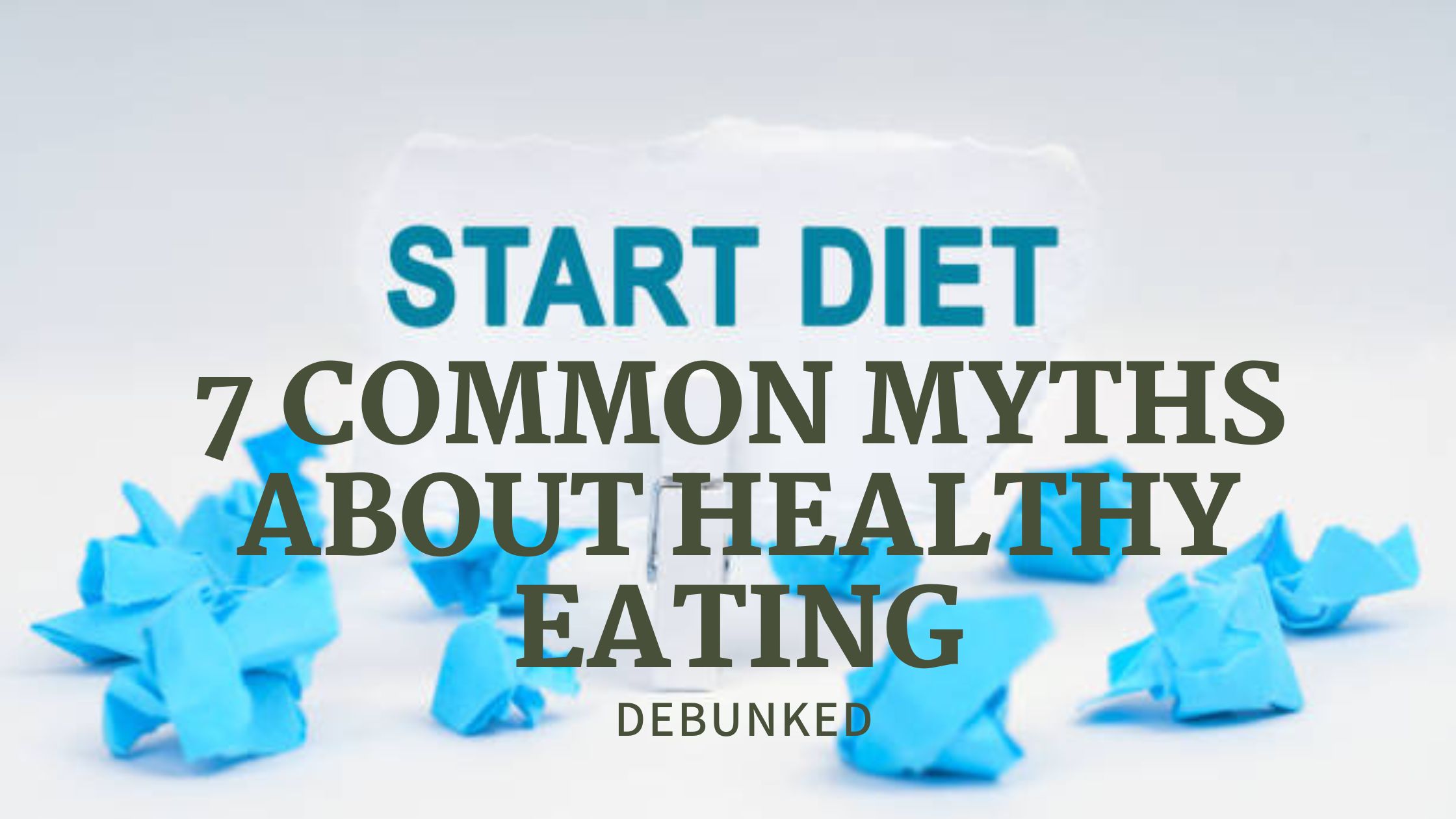Introduction
7 Common Myths About Healthy Eating—Debunked
When it comes to healthy eating, the abundance of information available can often lead to confusion and misconceptions. Let’s tackle some of the most common myths and set the record straight.
7 Common Myths About Healthy Eating

1. Myth: Carbs are the Enemy
Reality: Carbohydrates are a vital part of a balanced diet. The key is choosing complex carbs like whole grains, fruits, and vegetables, which provide essential nutrients and sustained energy.
2. Myth: Fat-Free Means Healthy
Reality: Not all fats are bad. Healthy fats, such as those found in avocados, nuts, and olive oil, are important for brain health and hormone production. “Fat-free” products often contain added sugars to improve taste.
3. Myth: Skipping Meals Helps with Weight Loss
Reality: Skipping meals can lead to overeating later in the day and slow down your metabolism. It’s better to eat regular, balanced meals to keep your energy levels stable and support weight management.
4. Myth: All Calories are Equal
Reality: The source of calories matters. Nutrient-dense foods like vegetables and lean proteins provide more health benefits compared to calorie-dense, nutrient-poor foods like sweets and fried snacks.
5. Myth: Detox Diets are Necessary for Health
Reality: Our bodies are equipped with natural detoxification systems (liver, kidneys). Eating a balanced diet with plenty of water, fiber, and nutrients supports these processes without the need for detox diets.
6. Myth: Eating After 8 PM Causes Weight Gain
Reality: Weight gain is not about the time you eat, but what and how much you eat. It’s the overall calorie intake and expenditure that matters. However, late-night snacking on unhealthy foods should be avoided.
7. Myth: Supplements Can Replace Whole Foods
Reality: Supplements can fill nutritional gaps, but they can’t replace the complex nutritional benefits of whole foods. A balanced diet should always be the priority.
Benefits of Healthy Eating
- Improved Energy Levels: Consuming a variety of nutrients supports sustained energy throughout the day.
- Better Mental Health: Certain nutrients, like omega-3 fatty acids, can positively impact mood and brain function.
- Weight Management: Healthy eating promotes a balanced intake of calories and nutrients, supporting a healthy weight.
- Disease Prevention: A diet rich in fruits, vegetables, and whole grains can reduce the risk of chronic diseases like heart disease and diabetes.
Suggestions for a Healthy Diet
- Eat a Rainbow: Include a variety of colorful fruits and vegetables in your diet.
- Stay Hydrated: Drink plenty of water to support bodily functions and overall health.
- Limit Processed Foods: Focus on whole, unprocessed foods to maximize nutrient intake.
- Practice Mindful Eating: Pay attention to hunger and fullness cues to avoid overeating.
Additional Tips
- Plan Your Meals: Prepare meals in advance to ensure balanced nutrition throughout the week.
- Read Labels: Be aware of added sugars, sodium, and unhealthy fats in packaged foods.
- Moderation is Key: Enjoy treats in moderation to maintain a balanced diet without feeling deprived.
Tips for Include healthy fats in diet
Including healthy fats in your diet is a great way to support your overall health. Here are some tips to help you incorporate them:

Healthy Fat Sources
- Avocados: Add sliced avocado to your salads, sandwiches, or smoothies.
- Nuts and Seeds: Snack on almonds, walnuts, chia seeds, or flaxseeds. You can also sprinkle them on yogurt or oatmeal.
- Olive Oil: Use extra virgin olive oil for salad dressings, drizzling over cooked veggies, or as a cooking oil for sautéing.
- Fatty Fish: Include fish like salmon, mackerel, sardines, and trout in your meals a few times a week.
- Nut Butters: Spread almond butter or peanut butter on whole-grain toast or use it as a dip for fruit.
- Coconut Oil: Use in moderation for baking or cooking.
- Dark Chocolate: Enjoy a piece of dark chocolate as a healthy dessert option.
Tips for Incorporating Healthy Fats
- Cooking: Use healthy oils like olive oil or avocado oil instead of butter or margarine.
- Salad: Enhance your salads with toppings like seeds, nuts, or avocado slices.
- Breakfast: Add a spoonful of nut butter to your morning oatmeal or smoothie.
- Snacking: Choose nuts, seeds, or a small piece of dark chocolate as snacks instead of chips or cookies.
- Main Dishes: Incorporate fatty fish or add avocado slices to your main dishes for an extra boost of healthy fats.
By including these sources of healthy fats in your meals and snacks, you’ll be able to enjoy their benefits and support your overall health. Enjoy your healthy eating journey
Some healthy late-night snacks
Late-night snacking doesn’t have to derail your healthy eating habits. Here are some nutritious options that can satisfy your cravings without weighing you down:

Healthy Late-Night Snacks
- Greek Yogurt: High in protein and calcium, add some berries or a drizzle of honey for extra flavor.
- Fruit and Nut Mix: A small handful of mixed nuts and dried fruit can provide a good balance of protein, fiber, and healthy fats.
- Whole-Grain Crackers and Hummus: This combination offers fiber and protein, which can help keep you satisfied.
- Apple Slices with Nut Butter: Apples provide fiber, and nut butter adds a dose of healthy fat and protein.
- Cottage Cheese: Pair it with some sliced tomatoes or a sprinkle of cinnamon and honey.
- Veggies and Guacamole: Carrot sticks, cucumber slices, or bell peppers dipped in guacamole make a crunchy, flavorful snack.
- Oatmeal: A small bowl of oatmeal with a dash of cinnamon can be comforting and filling without being heavy.
- Dark Chocolate: A piece of dark chocolate (70% cacao or higher) can satisfy your sweet tooth while providing antioxidants.
Tips for Late-Night Snacking
- Portion Control: Keep snacks small to avoid overeating before bed.
- Choose Nutrient-Dense Foods: Opt for snacks that provide a mix of protein, healthy fats, and fiber.
- Stay Hydrated: Sometimes thirst can be mistaken for hunger, so make sure to drink water throughout the evening.
These snacks can help curb hunger and provide essential nutrients to support your overall health. Enjoy your snack time!
Conclusion
Debunking these myths about healthy eating can help you make informed decisions about your diet. Remember, balance and moderation are the keys to maintaining a healthy lifestyle.
References
- Harvard T.H. Chan School of Public Health. (n.d.). The Nutrition Source.
- American Heart Association. (2020). Healthy Diet Basics.
- Mayo Clinic. (2021). Healthy Diet: Do You Follow Dietary Guidelines?
FAQs
Q: Is it okay to eat carbs if I’m trying to lose weight? A: Yes, choosing complex carbs like whole grains, fruits, and vegetables can provide essential nutrients and energy for weight loss.
Q: Do I need to take supplements? A: Focus on getting nutrients from whole foods first. Supplements can help fill gaps but shouldn’t replace a balanced diet.

